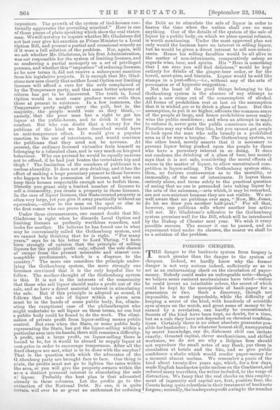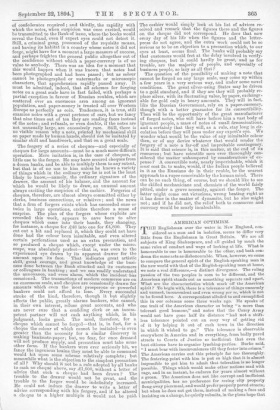FORGED CHEQUES. T HE danger to the banknote system from forgery
is much greater than the danger to the system of cheques. Indeed, we hardly know why the former danger is not very serious indeed, sufficiently so as to act as an embarrassing check on the circulation of paper- money. Nobody could make an unforgeable note—though we believe some eminent mechanicians have tried—unless he could invent an inimitable colour, the secret of which could be kept by the monopolists of bank-paper for a generation or two. Such a discovery, though not impossible, is most improbable, while the difficulty of keeping a secret of the kind, with hundreds of scientific eyes always on the watch, and great sums of money to be earned by a revelation, can hardly be overestimated. Secrets of the kind have been kept, no doubt, for a time, but as a rule they have not depended on chemical combina- tions. Certainly there is no other absolute guarantee pos- sible for banknotes ; for whatever honest skill, unsupported by secret knowledge, can do, dishonest skill can imitate exactly. Granted capital, clever mechanicians, and skilled workmen, we do not see why a Belgian firm should not reproduce the small notes of any Bank, put them in circulation at hotels and the like, and so give public confidence a shake which would render paper-money for a moment almost useless. We remember a panic of the kind about twenty-five years ago, which, for a few days, made English banknotes quite useless on the Continent, and reduced many travellers, the writer included, to the verge of distraction. We fancy that the real checks on this employ- ment of ingenuity and capital are, first, positive fear, the Courts being quite relentless in their treatment of banknote forgers; secondly, the inadequate profit owing to the number of confederates required ; and thirdly, the rapidity with which the notes, when suspicion was once excited, would be transmitted to the Bank of issue, where the books would reveal the fraud, even if expert eyes could not detect it. Still, a criminal gang, possessed of the requisite means, and having its habitat in a country whose notes it did not forge, might have for a moment a large measure of success, and perhaps frighten the general public altogether out of the confidence 'without which a paper-currency is of no value to anybody. There was an idea for a moment that this would happen when it was known that notes had been photographed and had been passed ; but as colour cannot be photographed or watermarks or microscopic characters, that apprehension rapidly passed away. It must be admitted, indeed, that all schemes for forging notes on a great scale have in fact failed, with perhaps a partial exception in favour of Russian roubles, which are scattered over an enormous area among an ignorant population, and paper-money is trusted all over Western Europe as perfectly as coin. Tradesmen, it is true, still examine notes with a great pretence of care, but we fancy that nine times out of ten they are reading faces instead of the notes ; and refusals, or even doubts, if the notes are not unusually large, are excessively rare. Still, there is no visible reason why a note, printed by mechanical skill on paper made by human hands, should not be imitated by similar skill and handiwork, and that on a great scale.
The forgery of a series of cheques—and especially of cheques for large amounts—must be a much more difficult operation. Mere imitation is, in the case of cheques, of little use to the forger. He may have secured cheques from a dozen banks, and be able to multiply them to any extent, but that is of no use to him unless he knows a variety of things which in the ordinary way he is not in the least likely to know,—namely, the ordinary signature of the drawer, the amount of his balance, and the amount for 'which he would be likely to draw, an unusual amount always exciting the suspicion of the cashier. Forgeries of cheques, therefore, are almost always committed either by clerks, business connections, or relatives; and the news that a firm of forgers exists which has succeeded once or twice in large operations, excites therefore a sense of surprise. The plan of the forgers whose exploits are recorded this week, appears to nave been to alter cheques which came into their hands, they changing, for instance, a cheque for £48 into one for £4,800. They cut out a bit and replaced it, which they could not have done had the colour been inimitable, and even altered certain perforations used as an extra precaution, and so produced a cheque which, except under the micro- scope, was absolutely perfect—that is, was even to the experienced eye drawn by its apparent drawer for the amount upon its face. That indicates great artistic skill, great courage, and great knowledge of the busi- ness done between the Bank attacked and its customers or colleagues in banking ; and we can readily understand the annoyance, and even alarm, which the incident has occasioned. The transactions of modern commerce are on an enormous scale, and cheques are occasionally drawn for amounts which even the most prosperous or powerful bankers could not afford to lose. Every successful stroke of the kind, therefore, though it but slightly affects the public, greatly alarms bankers, who cannot, in their own interest, refuse great accounts, and who are never sure that a confiding clerk or an incom- petent partner will not cash anything which, in his judgment, looks good. The need, therefore, for a cheque which cannot be forged—that is, in fact, for a cheque the colour of which cannot be imitated—is even greater than the necessity for a similar discovery in making banknote-paper ; but, we fear, for once demand will not produce supply, and precaution must take some other form. If the bankers were ever seriously hit, we fancy the ingenious brains they must be able to command would hit upon some scheme relatively complete ; but meanwhile what is the objection to the simplest precaution of all Why should it not be a rule adopted by all banks to cash no cheque above, say £1,000, without a letter of advice that such a cheque had been drawn ? The trouble to the drawer would not be great, and the trouble to the forger would be indefinitely increased. He could not induce the drawer to write a letter of advice corresponding with his forgery, and if he altered a cheque to a higher multiple it would not be paid. The cashier would simply look at his list of advices re-• ceived and remark that the figures there and the figures on the cheque did not correspond. He does that now every day of his life when the figures and the letter- press do not agree, and the extra work could not be so serious as to be an objection to a precaution which, to our eyes at least, seems final. The banks will probably say that customers would fret at the delay involved in verify- ing cheques, but it could hardly be great, and as for trouble, are the majority of people, and especially of business people, so lazy as all that ? The question of the possibility of making a note that cannot be forged on any large scale, may come up within a few years in a very serious way, and under some novel conditions. The great silver-using States may be driven to a gold standard, and if they are they will probably re- place silver, with its fluctuating value, by paper, exchange- able for gold only in heavy amounts. They will in fact, like the Russian Government, rely on a paper-currency, though with a better guarantee for its convertibility. Then will be the opportunity of the great manufacturer of forged notes, who will have before him a vast body of ignorant people, a mass of notes of small denominations, and a certainty that they will, as a rule, stay long in cir- culation before they will pass under any expert's eye. We wonder what would be the value of any inimitable colour then, or of any device whatever that would render the forgery of a, note a far-off and improbable contingency. It is said that science is, in this matter, at the end of its resources ; but have scientific men ever thoroughly con- sidered the matter unhampered by considerations of ex- pense A convertible note, nearly imperishable, which it must cost 28. to make, would, if the Indian people believed in it as the Russians do in their rouble, be the nearest approach to a rupee conceivable by the human mind. There can be no such thing, of course, but we should like to see the skilled mechanicians and chemists of the world fairly pitted, under a grave necessity, against the forger. The latter might come out victorious, wrong beating right as it has done in the matter of dynamite, but he also might not ; and if he did not, the relief both to commerce and currency would be nearly incalculable.



































 Previous page
Previous page